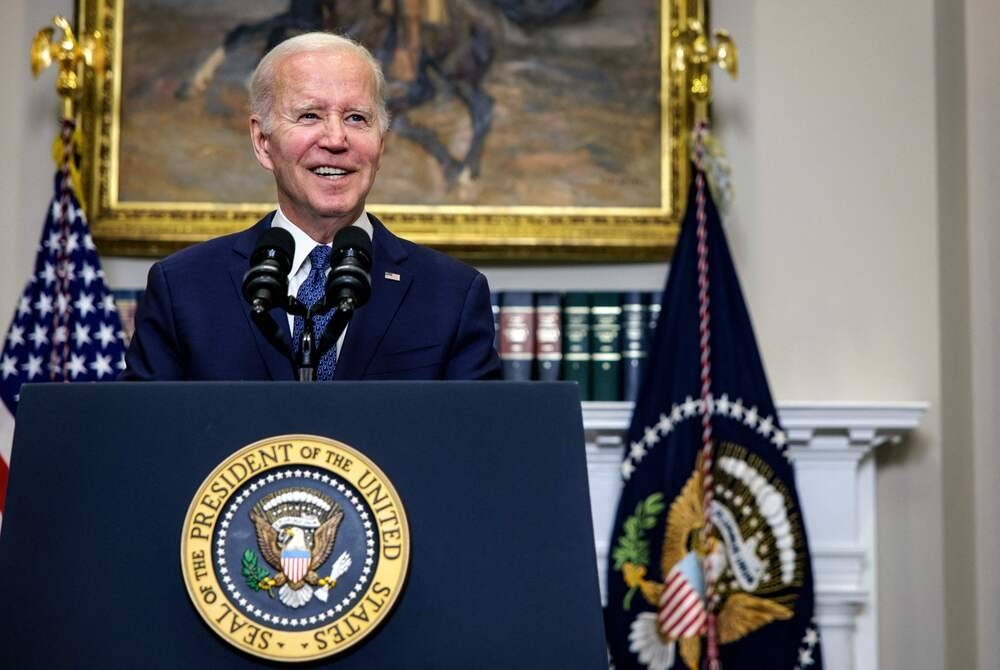Biden and McCarthy finalise US debt deal, say confident it will pass
LEON BRUNEAU
WASHINGTON, US - President Joe Biden and Republican leader McCarthy said Sunday that a final bipartisan deal to raise the US debt ceiling - and avoid a cataclysmic default - now heads to Congress, which will need to pass the agreement before the government starts running out of money.
The compromise after weeks of intense talks offers a path back from the precipice, even as the clock is still ticking down to the June 5 "X-date" when the Treasury estimates there might not be enough cash to pay bills and debts.
"I think it's a really important step forward," Biden said in a brief appearance before media at the White House, urging "both chambers (of Congress) to pass that agreement." "It takes the threat of a catastrophic default off the table, protects our hard-earned and historic economic recovery, and... represents a compromise that means no one got everything they want," Biden added.
The White House said Biden and McCarthy spoke earlier in the day as they struggled to avert a financial precipice which threatened to throw millions of people out of jobs and risk a global meltdown.
McCarthy, for his part, voiced optimism that the bipartisan deal could get through Congress despite skepticism from some lawmakers on both sides of the aisle.
In a statement later Sunday, the speaker and other Republican congressional leaders touted the agreement as a "historic series of wins." McCarthy has summoned lawmakers from the House of Representatives back to Washington from a holiday recess to vote on the deal on Wednesday.
The basic framework of the deal suspends the federal debt ceiling, which is currently $31.4 trillion, for two years - enough to get past the next presidential election in 2024 and allow the government to keep borrowing money and remain solvent.
In return, the Republicans secured some limits on federal spending over the same period.
Congressional opposition to the bill comes from an unlikely union of hard-right Republicans who wanted deeper spending cuts and progressive Democrats who wanted no reductions at all.
McCarthy's wafer-thin majority in the House means passing the bill will require significant Democratic backing to balance out Republican dissent.
The speaker was out pushing the deal Sunday, arguing on the Fox network that the spending limits were a significant victory and insisting that 95 percent of House Republicans were "very excited." By Sunday evening, the 99-page proposal was released publicly, available for scrutiny by lawmakers before the vote.
Top Republican Senator Mitch McConnell called on his own chamber - controlled by Democrats - to "swiftly pass this agreement without unnecessary delay." But the tone of the Republican opposition was set by Representative Dan Bishop - a member of the ultra-conservative House Freedom Caucus -- who tweeted a vomit emoji and slammed McCarthy for securing "almost zippo." - 'Scorched Earth' - Nicholas Creel, a political analyst and business law professor at Georgia College and State University said the deal was "ultimately likely" to pass through Congress, but he warned that "Freedom Caucus Republicans have the potential to play spoiler if they decide to go scorched Earth on McCarthy." The agreement represents a climb down of sorts by both sides.
Biden had initially refused to negotiate over spending issues as a condition for raising the debt ceiling, accusing the Republicans of taking the economy hostage.
And the big cuts that Republicans wanted are not there, although nondefense spending will remain effectively flat next year, and only rise nominally in 2025.
"Overall, the deal is probably best viewed as a win for Biden and Democrats given that it contains fairly modest spending cuts and would prevent another debt ceiling showdown or a government shutdown during the remainder of Biden's presidency," Creel said.
"Nobody has enough power to get too much of what they want right now, so a compromise like this that makes everyone a little unhappy is probably the best anyone could have hoped for," he added.
The countdown to the "X-date" means the legislation will have to clear Congress much more quickly than the normal timetable for even the most uncontroversial bills.
McCarthy is hoping to bring the narrow House majority of 222 Republicans with him, but opposition will come from 35 far-right lawmakers who told him to "hold the line" for more sweeping spending cuts.
That means a large number of Democrats will have to be persuaded to vote with a reduced number of Republicans - something that rarely happens on big bills.
Pramila Jayapal, chair of the House Progressive Caucus, said the Democratic leadership should be concerned about securing their support.
"Yes, they have to worry," she told CNN, adding she was "not happy" with what she was hearing about the concessions made by Biden.
If a default still occurs, the government would not miss loan repayments until mid-June but in the meantime it would likely have to halt $25 billion in social security checks and federal salaries. - AFP














